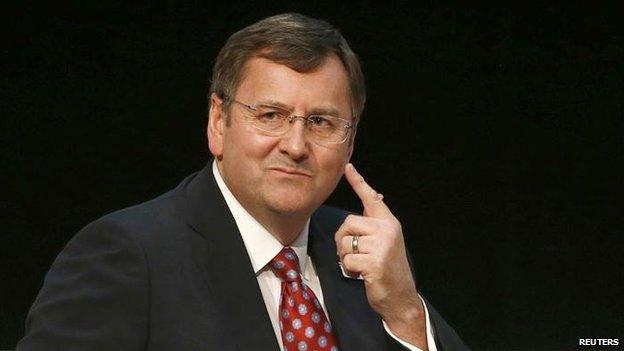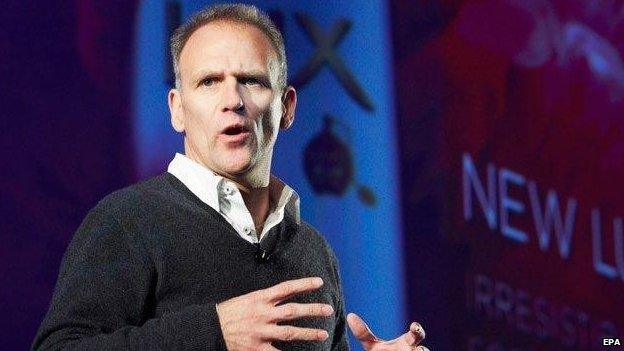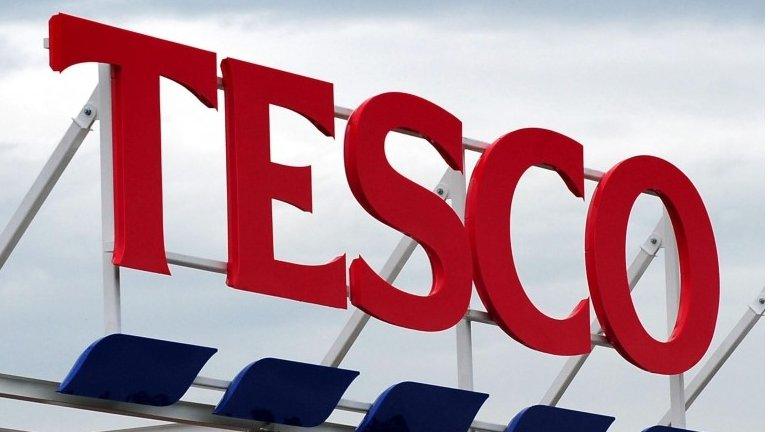Philip Clarke tells BBC of 'enormous relief' as he quits Tesco
- Published
- comments

Tesco is Britain's biggest and most profitable retailer. To be its chief executive is to be in a job about which everyone has an opinion.
Messy aisles. Missing products. Unhelpful staff. "Sort it out" would come the cry from millions of customers.
Philip Clarke has even revealed that his dad was regularly on the phone, telling his 54-year-old son what's right and what's wrong with the local store in Liverpool.
It would be fair to say that Mr Clarke "was resigned" this morning. Sacked is a word rarely uttered in boardrooms and the chairman, Richard Broadbent, was certainly careful not to use it.
Party cancelled
But the fact that Mr Clarke was preparing for a party to mark his 40th year at Tesco tomorrow night suggests that he did not see it coming. That party has now been cancelled.
Mr Clarke told me this morning that he felt an "enormous sense of relief" that his resignation has happened.
He said that it was clearly an "emotional" time but he had "nothing to regret, only positive thoughts". Friends had apparently been telling him that the last three years of change had taken their toll.
I asked him directly whether it was his choice to leave at this moment, given that in recent interviews he has been talking about his desire to carry on until he was 60.
His answer was somewhat Delphic. "[The date] is not one of my choosing but it is a choice I would willingly make."
Mmmm.
'Heart-breaking'
Mr Clarke revealed that the job had been tough.
He said that he had found it "heart-breaking" to sell businesses in countries such as Japan and the United States' Fresh and Easy franchise.
The turnaround programme he had put in place to make Tesco a multi-channel retailer had clearly taken its toll.
"You get attached to things," he said of why sometimes a board needs fresh blood. He was sticking to the line that this was good succession planning.
Many would agree, but for a different reason.
Analysts at Jefferies said this morning: "In the space of a couple of weeks Tesco has rebuilt a strong management team. The addition of Dave Lewis as CEO to that of Alan Stewart as CFO [chief financial officer] creates more credible conditions for a turnaround of the group."
It is probable that Mr Stewart, who was announced as the new CFO last week, knew about Mr Clarke's departure before he did.

Tesco points out that since Mr Lewis joined Unilever in 1987 he has been responsible for a number of business turnarounds.
Pincer movement
When I was speaking to Mr Broadbent this morning, he was keen to say that Mr Clarke had done "an extraordinary amount".
He also said that a "fresh pair of eyes" was necessary, which is where Mr Lewis comes in.
I have written regularly before on Tesco's problems.
The retailer was trapped in a pincer movement. From above, retailers such as Waitrose and Marks & Spencer had a more compelling offer.
From below, Aldi and Lidl were eating Tesco's lunch as the UK's cheapest shop. Tesco appeared to be stuck in a cul-de-sac.
The "everything to everyone" strategy via whichever shopping channel customers' desire (physical buildings or digital) will take a long time to bed in.
In the meantime falling like-for-like sales was certainly making investors jittery.
Looking at his time at Unilever, Mr Lewis is not a man afraid of making radical decisions. When he was head of Unilever's UK business he slashed the number of products it made from 1,600 to 400.
In an interview with The Grocer in 2009, Mr Lewis said that Unilever, which had been suffering a decline in market share (sound familiar?) was "old, respected and slightly deferential".
Choosers and users
He also said that as a business it simply cost too much to run. Some 40% of costs were slashed, salaries were frozen and travel budgets cut.
Mr Lewis is the man behind the launch of Dove and is now in charge of Unilever products such as Lynx and Simple. He certainly knows about the value of "brands" in crowded markets.
Tesco sources say that the supermarket has to define what it is for.
Customers have to want to use it rather than simply go in because it is present on every high street ("choosers rather than users" in retail parlance).
The biggest question for Tesco's shareholders will be Mr Lewis's lack of retail experience.
With Mr Stewart, ex-M&S, he has help. But he will still have to prove that he can run such a huge business.
- Published27 June 2014
- Published4 June 2014
